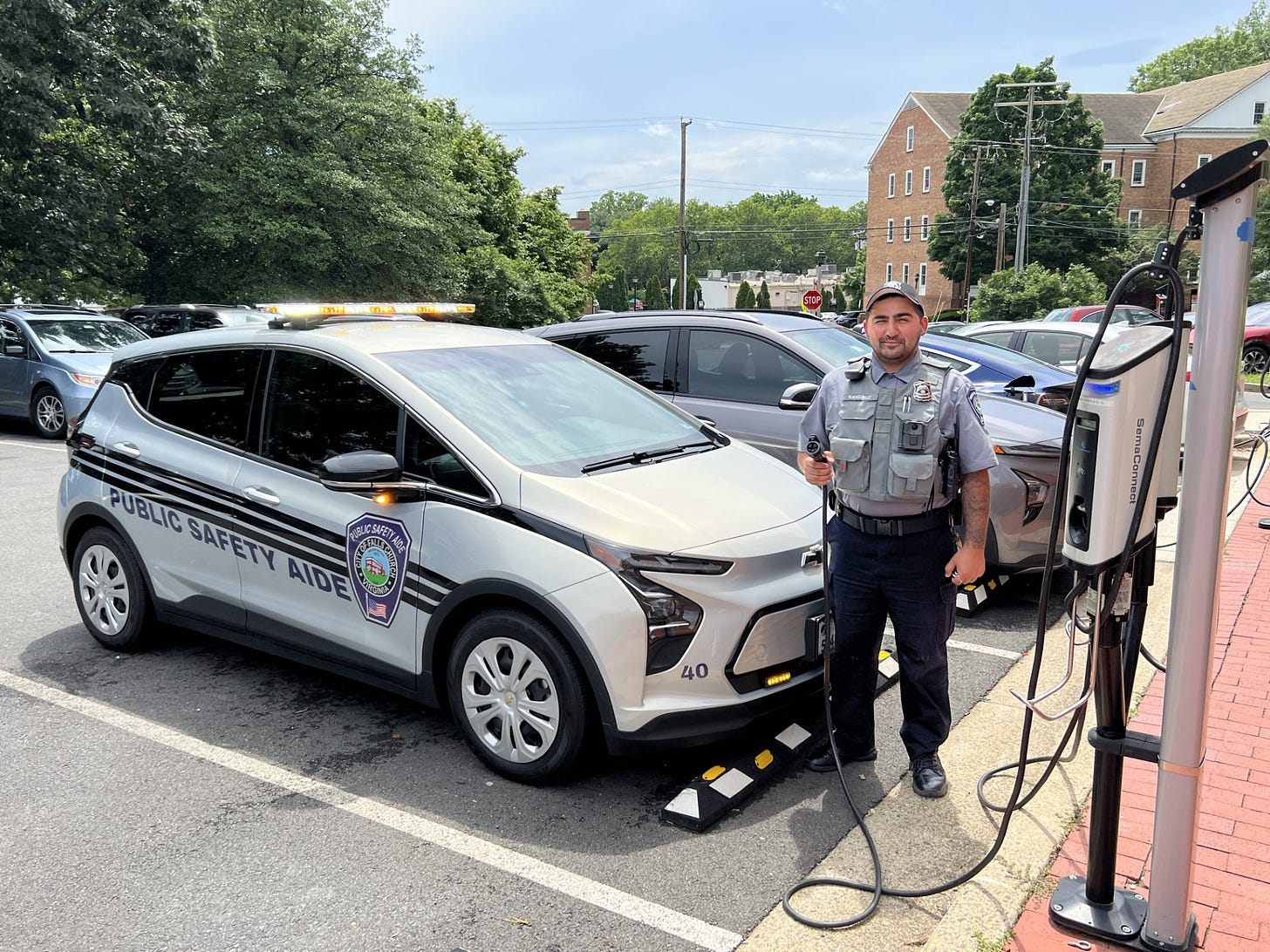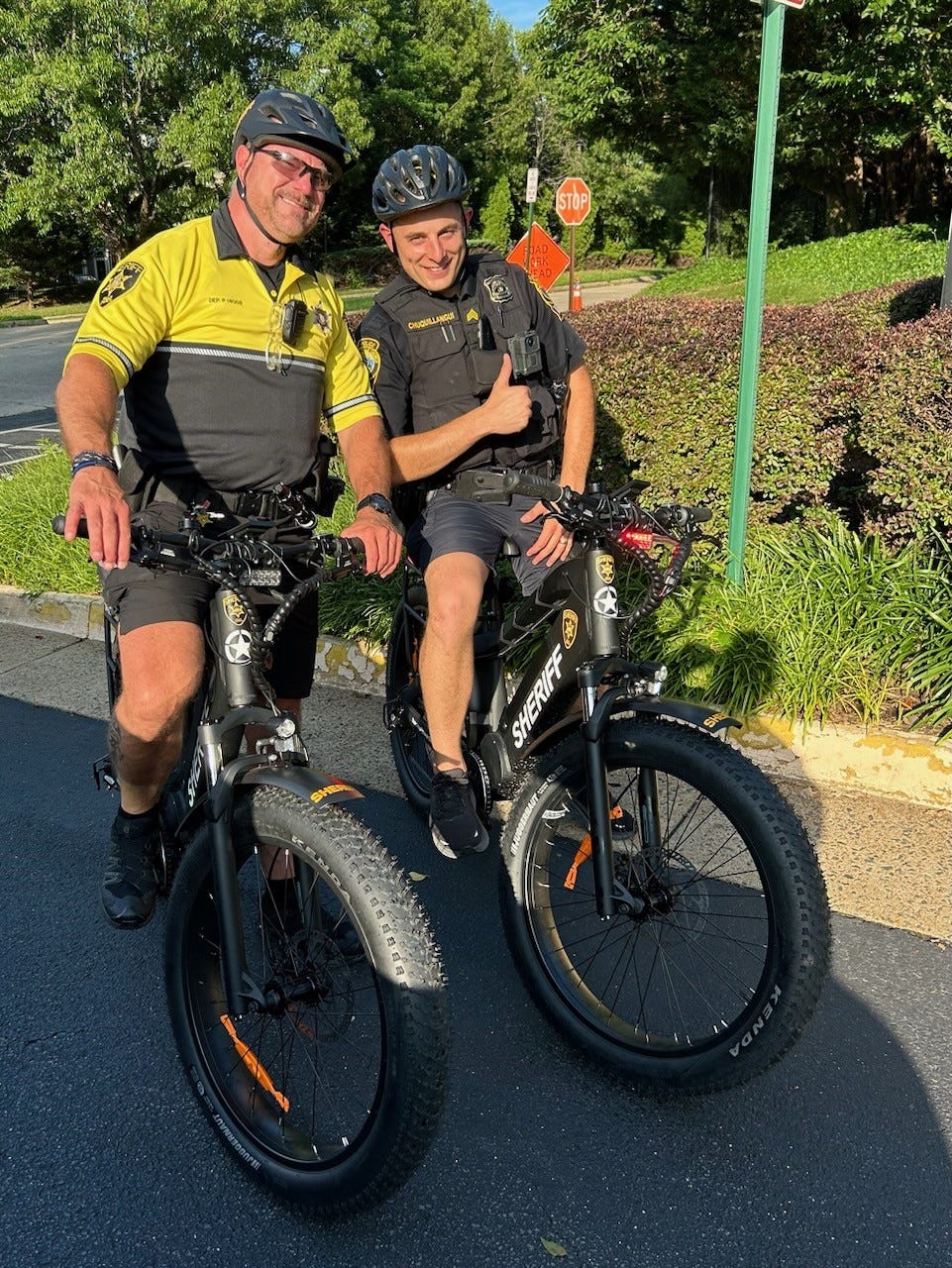Small Footprint Electric Vehicles and Bikes, Big Impact
The "Little City" Having a Big Impact in Fight Against Climate Change
Northern Virginia’s local governments are doing critical work with respect to wide ranging environmental matters including sustainability, resiliency and climate change. We are pleased to highlight the work of our colleagues in the City of Falls Church and their efforts to reduce their transportation climate footprint.
Members of the City of Falls Church Police Department and Sheriff's Office are riding in style and preserving the environment, all while on the job. This new fleet of five electric vehicles (EVs) and two bikes is instantly recognizable and helps bridge law enforcement and the community.
In 2017, City Council adopted the Metropolitan Washington Council of Governments (MWCOG) regional goals of reducing emissions of greenhouse gases (GHGs) below 2005 levels by 20 percent by 2020 and 80 percent by 2050. And in 2020, City Council supported adopting a regional interim goal by MWCOG to achieve a 50 percent reduction in regional GHG emissions by 2030.
Born out of the City Council's interest in EVs and a need-turned-idea to shift and combine parking enforcement and crossing guard positions into a joint Public Safety Aide (PSA) position, the Police Department identified using PSAs as an excellent opportunity to pilot EVs. PSA vehicles are only used during the day, allowing for recharging overnight.
According to Captain Stephen Rau, who led the Police Department's transition to EVs, "The City chose the 2022 EV Chevy Bolt because General Motors offered a special service vehicle option. This option, specifically for government, not civilian vehicles, added extra power leads needed for the addition of vehicle lights, computers, and police radios and controls."
The first two compact, snazzy EV Chevy Bolts went into service in 2022. They've already positively impacted the Police Department and the City as it transitions to hybrid and electric vehicles as part of its Government Operations Energy Action Plan.
Did you know a gallon of gas emits about 19.5 lbs. of carbon dioxide (CO2)? When speaking to Captain Rau about cost and emission savings specifics, he compared one of the EVs to the 2014 Ford Pickup Truck it replaced. On average for the year, the 2014 vehicle got 12 MPG, required about 916 gallons of gas for 11,000 miles, cost about $2,748 in fuel alone, and emitted 17,862 lbs. of carbon dioxide. That's almost nine tons per year!
In contrast, the EV's average electricity usage is 3.2M per kilowatt hour for 11,000 miles per year. Electricity usage is approximately 3437.5 kilowatts, costing around $481.25 to charge. Best of all? The EV produces zero carbon dioxide!
Five EVs are now in service with the Police, saving the City over $9,000 in fuel costs annually. The two originals have a radio, emergency lights, and a distinct PSA vehicle wrap that differ from pursuit-rated sworn officer vehicles. Three additional unmarked EVs are for Command Staff, including one for Chief of Police Mary Gavin, who proudly leads by example.
"Along with the quantifiable impacts the EVs have made in reducing the City's emissions, the cascading effects are far-reaching. Emergency vehicles, including police cars, are intended to be large to accommodate an officer's mobile office space, road closers, crime scene support, and prisoner transports," said Chief Gavin. "The City's PSAs, and by extension, their unique, agile, and approachable EVs, are an essential link to the community. They interact with the public daily, often visible during PSA crossing guard shifts at school drop-off and dismissal."
In addition to these vehicles, the City of Falls Church Sheriff's Office recently acquired two electric bikes. The bikes are law enforcement heavy-duty, have on and off-road and pavement capabilities, and can traverse stairs and steep or rough grade paths. The manufacturer purpose-built them with emergency lights, sirens, flood lights, and medical kits, including AEDs.
The EV bikes have removable charge packs that can run all day on one charge, recharge quickly, and retain their pedaling capabilities. They are quiet, mobile, and ideal for operating in crowded, limited, and congested event areas.
The Sheriff's Office will use these new bikes for safety patrols during City events, on City trails, and at parks and shopping centers. Similar to the Police EVs, their versatility and utility are expansive and will serve as a connection to the community.
From playing a pivotal role in helping the City of Falls Church, and the region, achieve goals of reducing emissions of greenhouse gases to assisting the Police and Sheriff's Departments in building a rapport with the community; it's fair to say these EVs and bikes are having an outsized impact.
Interested in learning about all City of Falls Church Environmental Programs? Visit their webpage.
About the Northern Virginia Regional Commission
NVRC is a consortium of thirteen local governments representing more than 2.5 million residents. The region has a GDP of $250 Billion which is 41.4% of the GDP of the Commonwealth of Virginia. Northern Virginia’s GDP is larger than 23 states and the District of Columbia and if a country would be the 49th largest economy in the world.





